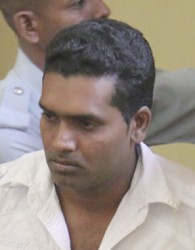Baker Doodnauth Beharry will be spending the next 48 months in prison for narcotics trafficking after a court found him guilty of having almost 16 grammes of cannabis.
In addition, Beharry, 29, was ordered to pay a mandatory fine of $30,000.
The ruling was handed down by trial magistrate Judy Latchman amidst loud wails by Beharry’s sister and mother, who were ordered to leave the courtroom.
The man’s sister, who fell to the ground, wept uncontrollably and her actions disturbed the court’s proceedings, resulting in a relative and the orderly escorting her outside.
Meanwhile, a tearful Beharry, who stood as the ruling was being handed down, appeared visibly shocked at the decision and later fell into a chair.
The man was convicted of a charge which stated that on October 1, at 100 La Penitence Street, Albouystown, George-town, he had in his possession 15.9 grammes of cannabis for the purpose of trafficking.
The prosecution’s facts are that on the day in question, pursuant to certain information received, a party of police men went to his home, where they conducted searches for narcotics. The court had been told during the trial that a quantity of leaves, seeds and stems were later found concealed in the defendant’s crotch in six transparent Ziploc bags which were contained in a white plastic bag.

Beharry had denied the allegation at his arraignment. He had been admitted to bail at a subsequent hearing and a trial later commenced.
In handing down its ruling, the court detailed that the prosecution had discharged its burden of proof of having to substantiate that the defendant had knowledge, care, custody and control of the drugs.
Magistrate Latchman noted that Beharry had control of the cannabis as it was found in his crotch.
Additionally, the court said that knowledge existed when the defendant freely and voluntarily admitted to having the drug in his oral statement, saying “is a customer bring um.”
During the trial, the court conducted a voir dire and found that the oral statement was given freely and voluntarily by Beharry.
The court attached weight to the issues of knowledge, care and custody also by highlighting that the substance was found in a private region of the man’s body.
The man’s attorney Gwendolyn Bristol, after losing her case, indicated to the court her intention to appeal.





